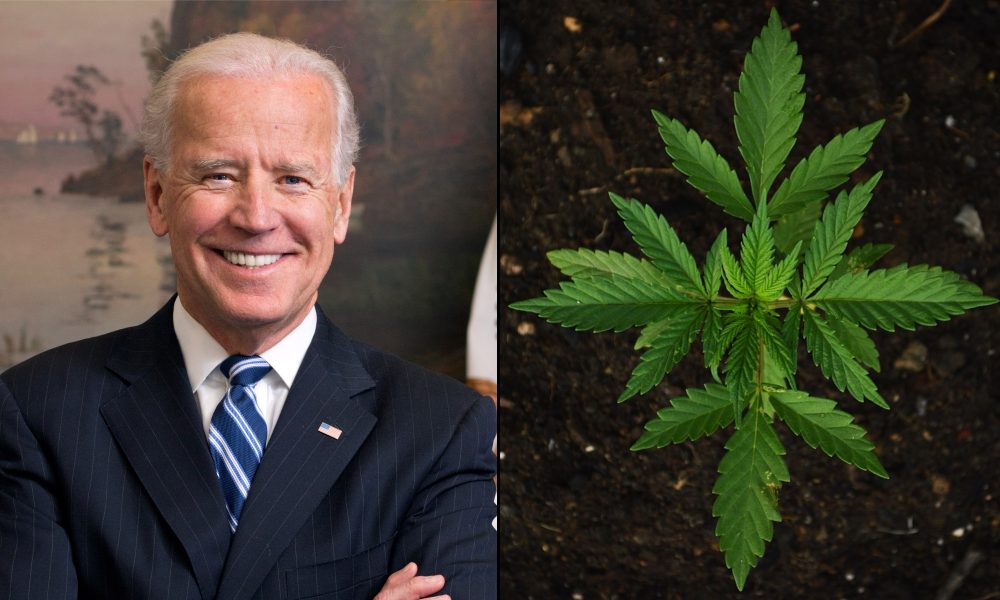President Joe Biden on Monday said that marijuana reform is part of his commitment to “equal justice,” arguing that people should be released from prison and have their records cleared for simple possession.
Speaking at a Martin Luther King Jr. Day hosted by the National Action Network’s (NAN), the president said he was keeping his “promise” by providing relief to those who’ve been criminalized over cannabis.
“No one—I’ll say it again—no one should be in federal prison for the mere possession of marijuana. No one,” he said.
“In addition to that, they should be released from prison and completely pardoned and their entire record expunged so that if they have to ask, ‘Have you ever been [convicted], you can honestly say, ‘No,’” he added.
Biden didn’t go into detail about the mass pardon he issued in October, granting clemency to several thousand people who’ve committed federal marijuana possession offenses. But he’s repeatedly described the action as an example of a campaign promise that he’s fulfilled.
It’s notable that he also talked about expungement and releasing people who are currently incarcerated over cannabis.
The pardons that he provided don’t technically expunge those records, as that falls beyond his executive authority—but he’s encouraged governors to follow his lead by granting relief at the state level where their authority may be different and where the bulk of cannabis cases have been prosecuted.
In terms of releasing currently incarcerated people, that’s something that advocates have strongly pushed for given that there are still thousands behind bars over federal cannabis offenses. But Biden has made clear that he’s only willing to extend relief to those with simple possession convictions and not those who’ve sold cannabis, for example.
The U.S. Sentencing Commission (USSC) recently released a report that showed record-low federal marijuana prosecutions during the last fiscal year and noted that there aren’t any people currently serving time over cannabis possession.
At the MLK Day breakfast, Biden also briefly mentioned his administration’s work to secure the release of WNBA player Brittney Griner, a medical marijuana patient who served 10 months in a Russian prison over possession of cannabis vape cartridges before a prisoner swap was negotiated last month.
Rev. Al Sharpton, a criminal justice reform advocate who founded NAN, said in a press release ahead of the event that Biden has “shown a relentless commitment to not only upholding but expanding civil rights in the United States.”
Meanwhile, Domestic Policy Council Director Susan Rice said last month that the president’s cannabis clemency and directive for an administrative review into cannabis scheduling have helped address the country’s “failed approach to marijuana” and represent key parts of the administration’s “remarkably productive year.”
Rice was also among various officials who cheered Oregon’s governor for providing state-level relief following Biden’s call-to-action.
Meanwhile, a bipartisan group of 29 congressional lawmakers from both the House and Senate sent a letter to the president last month, asking that he formally back federal marijuana legalization as the administration carries out the cannabis scheduling review.
The letter was sent to the president and the key cabinet officials following a pair of major setbacks for advocates, with lawmakers failing to attach marijuana banking and other reforms to either the National Defense Authorization Act (NDAA) or omnibus appropriations legislation last month.
While the lawmakers didn’t request that Biden take administrative action to unilaterally facilitate legalization, it does underscore an eagerness among supporters for the White House to play a more proactive role in advancing reform.
U.S. Health and Human Services (HHS) Secretary Xavier Becerra, who was CCed on the letter, tweeted a link to a Marijuana Moment article that discusses the president’s administrative cannabis scheduling directive.
“We’re going to take a look at what science tells us and what the evidence tells us,” Becerra, who has a considerable record supporting cannabis reform as a congressman and as California’s attorney general, said at the recent overdose prevention event. “That will guide what we do—and we hope that will guide what the federal government does.”
Following the president’s October announcement, the secretary said that the department would “work as quickly as we can” to carry out the scientific review. And he’s already discussed the issue with the head of the Food and Drug Administration (FDA) to that end.
Separately, the White House drug czar said that that the president’s action was “historic,” adding that there are “clearly” medical benefits of cannabis.
Like HHS, DOJ has similarly committed to quickly carrying out the separate scheduling review the president directed, which could result in a recommendation to place cannabis in a lower schedule or remove it altogether, effectively legalizing the plant under federal law.
The president also officially signed a marijuana research bill into law last month, making history by enacting the first piece of standalone federal cannabis reform legislation in U.S. history.
A series of polls have shown that Americans strongly support the president’s pardon action, and they also don’t think that marijuana should be federally classified as a Schedule I drug.
First Marijuana Bill Of The New Congress Is A GOP-Led Gun Rights Measure
Read the full article here


